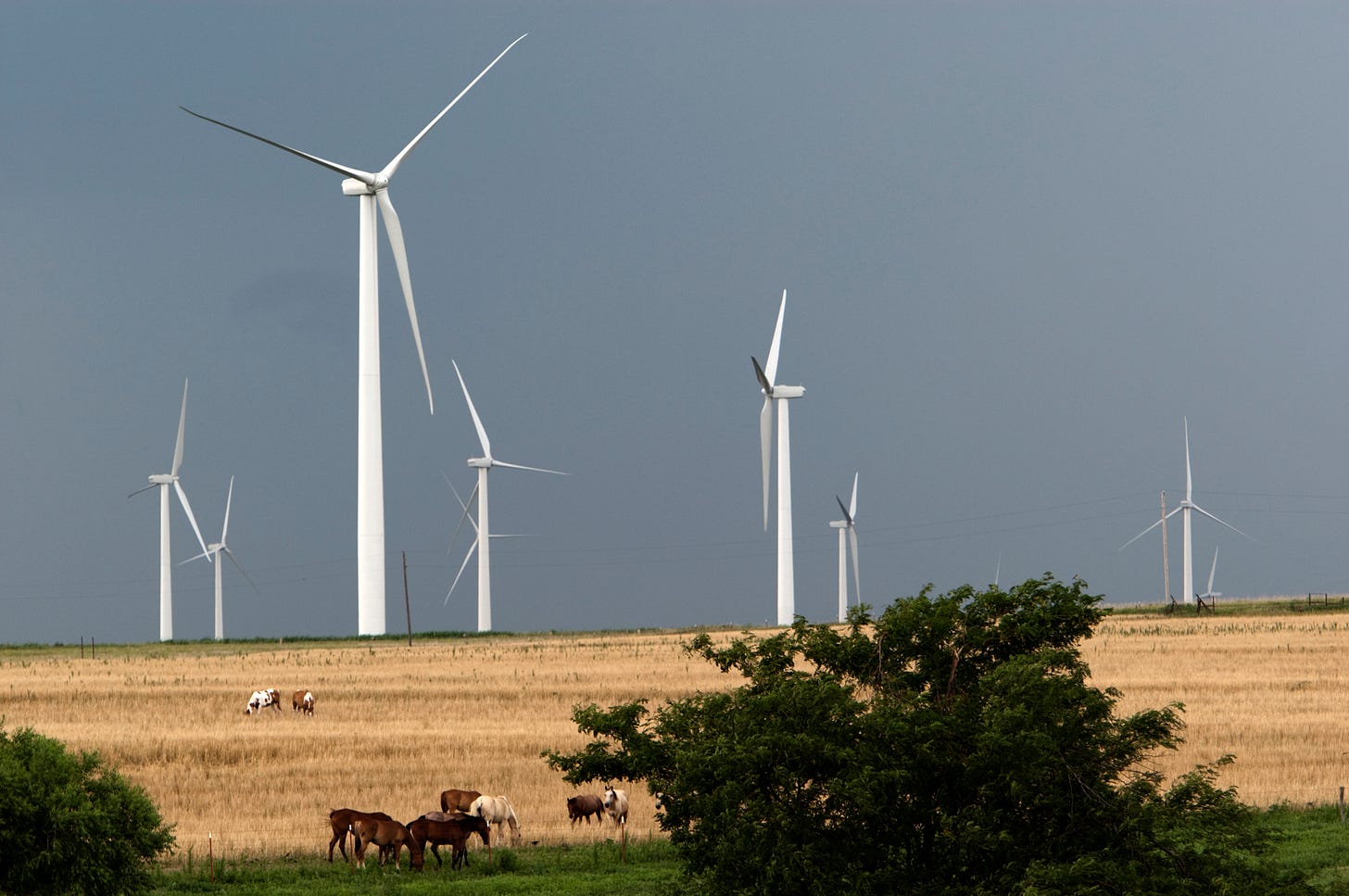TL(PM) DIGEST: The backlash, my friends, is blowin' in the windmills
Plus China becomes the world's top auto exporter, Italy backs out of Beijing's Belt and Road Initiative, and The Weather Channel stands as America's most trusted news source

1. Local backlash builds to the clean energy transition
What happened? The Wall Street Journal reports on a budding backlash around the country to clean energy initiatives—specifically wind and solar projects.
Why does it matter? Local residents express a range of concerns about noisy, disruptive wind turbines and land being gobbled up by energy companies. State and local governments are responding by putting up roadblocks to clean energy expansion:
In Iowa, which has the second-highest installed wind power capacity in the country after Texas, a 2022 study of wind ordinances found that 16 of 99 counties had prohibitive rules or a ban against new projects, most of them approved in the previous four years. Between moratoriums and requirements for setbacks between turbines and things such as neighboring property lines, roads or buildings, developers won’t even consider projects on around half to three quarters of land with good wind resources, according to a study by the nonprofit research firm ClearPath and consulting group LucidCatalyst.
Despite soaring demand and available capital even before the Inflation Reduction Act was passed, U.S. clean power installations dipped 16 percent last year and 12 percent over 2020, according to the American Clean Power Association. It was the worst year for land-based wind installations since 2018.
TLP’s take: America desperately needs to reform permitting processes and other regulatory obstacles to ensure its new industrial policy can build the new factories, power plants, and infrastructure the nation needs. But local attempts to maintain their communities and landscapes must be respected in one way or another—not dismissed as mere NIMBYism.
2. China set to become world’s largest car exporter
What happened? The Financial Times reports that China’s auto industry overtook German car exports in 2022 and looks set to overtake Japan as the world’s largest auto exporter this year. Chinese automakers now outsell foreign rivals within China’s own domestic car market as well.
Why does it matter? German automakers like Volkswagen have depended on China for half their annual profits, but their positions looks likely to take a hit as more Chinese consumers buy Chinese-made cars and auto manufacturing transitions from internal combustion engine vehicles to electric ones. As German firms lose market share in China, it only reinforces the German government’s painful, glacial retreat from a foreign policy that previously focused heavily on advancing the interests of German companies above all other considerations.
TLP’s take: Exaggerated concerns about “deglobalization” and “decoupling” once again miss the mark, with German companies investing even more in China in a likely futile effort to retain market share and China itself poised to become the world’s largest auto exporter. It also goes to show that it’s wrong to think of “globalization” as a static or permanent phenomenon that can ignore geopolitics rather than one that would change and evolve with the world economy and geopolitics as a whole—especially a global economy where one enormous national economy consistently runs “amazing high trade surpluses” and wants “to dominate manufactured exports.”
3. Italy looks to back out of China’s Belt and Road Initiative
What happened? Italy, the only G7 nation to have signed up to Chinese dictator Xi Jinping’s signature Belt and Road Initiative, will likely quit program when the five-year deal it struck with Beijing comes up for renewal early next year. The previous Italian government had already suspended Rome’s participation and applied greater scrutiny to potential Chinese investments in Italy, leading to vetoes of three potential Chinese corporate takeovers.
Why does it matter? When Italy joined the Belt and Road Initiative back in 2019, it seemed like a major diplomatic and geopolitical coup for Beijing. Italy’s decisions to slowly back away from the deal and let it lapse can only be seen as diplomatic defeats for a Chinese government intent on driving wedges between the United States and its European allies.
TLP’s take: Ultimately, Italy’s time in the Belt and Road Initiative proved symbolic—but symbols and other intangibles remain important in international relations and global politics. Accordingly, it’s good for the United States and the cause of freedom that Rome will back out of its Belt and Road deal when it comes up for renewal next year.
4. Let’s talk about—the weather!
What happened? New polling data from The Economist/YouGov shows net public trust in a long list of media institutions—with The Weather Channel (TWC) emerging on top in terms of overall trust, followed by PBS and the BBC.
Why does it matter? By a 53-point margin, Americans are more likely to say The Weather Channel is trustworthy rather than untrustworthy. TWC is followed by PBS (+30 net trust), the BBC (+29), and the Wall Street Journal (+24). Wide partisan differences emerge with a majority of Republicans only trusting The Weather Channel and Fox News, and Democrats expressing higher trust in several traditional news outlets.
TLP’s take: Politics is so toxic today that it’s not in the least bit surprising that most Americans would rather just talk about the weather. With another interminable presidential election upon us, it would behoove the news media—and the political parties—to try to build a politics worth paying attention to and create stories that lead to reasonable debate rather than nonstop yelling and accusations of perfidy at those who hold different views.
Just one more thing…
NASA is developing a creepy, serpentine robotic explorer—appropriately called “Exobiology Extant Life Surveyor”, or EELS—to plumb the depths of Enceladus, one of the moons of Saturn that’s speculated to have an ocean of liquid water beneath an icy crust.




